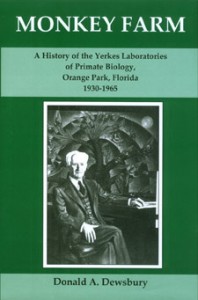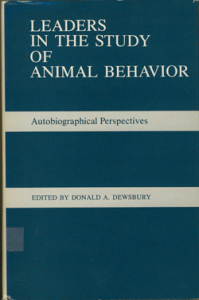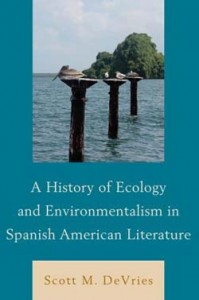Along with the other, more obvious, December holidays, this month we also celebrate Monkey Day! December 14th is the unofficial holiday reminding you to appreciate your fellow primates. Begun in 2000 by artist Casey Sorrow at Michigan State University, it has spread all over the world with celebrations occurring in zoos such as Lahore Zoo in Pakistan and the Tallinn Zoo in Estonia. A day for costume parties and meant to draw attention to medical research and animal rights, particularly for simians, take part in Monkey Day this year with the Bucknell Press!
Here at the Press, we support Monkey Day this month with a showcase of our own monkey and ecology themed works: Monkey Farm by Donald Dewsbury expands on the history of Yerkes Laboratories of Primate Biology; Leaders in the Study of Animal Behavior edited by Donald Dewsbury relates the autobiographies of leading scientists in the animal behavior medium; and A History of Ecology and Environmentalism in Spanish American Literature by Scott M. Devries presents an ecocritical examination of the region’s literature.
Monkey Farm: A History of the Yerkes Laboratories of Primate Biology, Orange Park, Florida, 1930-1965
By Donald Dewsbury
 This book is a history of the Yerkes laboratories of Primate Biology. The facility was founded as the Laboratories of Comparative Psychobiology of Yale University by Robert M. Yerkes, one of the leading psychologists of the twentieth century. The Yerkes Laboratories became the largest and most important collection of chimpanzees for research in the world. During its thirty-five-year history it was home to some of the leading behavioral scientists of the time. The book is, in essence, a biography of an institution.
This book is a history of the Yerkes laboratories of Primate Biology. The facility was founded as the Laboratories of Comparative Psychobiology of Yale University by Robert M. Yerkes, one of the leading psychologists of the twentieth century. The Yerkes Laboratories became the largest and most important collection of chimpanzees for research in the world. During its thirty-five-year history it was home to some of the leading behavioral scientists of the time. The book is, in essence, a biography of an institution.
Leaders in the Study of Animal Behavior
Edited by Donald Dewsbury
 Brought together in this volume are autobiographical chapters written by nineteen of the leaders in establishing the science of animal behavior as a vigorous discipline in the twentieth century. The diversity of the authors parallels the diversity of approaches in the field. The range includes representatives of core ethology, comparative psychology, and general zoology. There are both field and laboratory workers. Ten reside in Europe, nine in the United States. Two have won Nobel Prizes and one a Pulitzer Prize.
Brought together in this volume are autobiographical chapters written by nineteen of the leaders in establishing the science of animal behavior as a vigorous discipline in the twentieth century. The diversity of the authors parallels the diversity of approaches in the field. The range includes representatives of core ethology, comparative psychology, and general zoology. There are both field and laboratory workers. Ten reside in Europe, nine in the United States. Two have won Nobel Prizes and one a Pulitzer Prize.
The focus of each chapter is the life of the author as related to the discipline — these are scientific autobiographies. Important events are recounted and each author provides his perspective on the field. Contributors to this volume were selected by a panel of seven animal behaviorists, themselves representing different disciplines, who made an effort to select among the most prominent living senior workers in the field.
The book should be an indispensable part of the history of the study of animal behavior — unique in bringing together first-hand accounts of the development of the field written by its leading, living practitioners. It should also be a guide for young students in making intellectual career decisions and seeking models and modes for important research and professional directions. Science is seen as being conducted by living, breathing human beings, with the same aspirations, doubts, and frailties as other human beings.
A History of Ecology and Environmentalism in Spanish American Literature
By Scott M. DeVries
A History of Ecology and Environmentalism in Spanish American Literature undertakes a comprehensive ecocritical examination of the region’s literature from the foundational texts of the nineteenth century to the most recent fiction. The book begins with a consideration of the ways in which Argentine Domingo Faustino Sarmient’s views of nature through the lens of the categories of “civilization” and “barbarity” from Facundo (1845) are systematically challenged and revises in the rest of the century. Subsequently, my book develops the argument that a vital part of the cultural critique and aesthetic innovations of Spanish American modernismo involve an ecological challenge to deepening discourses of untamed development from Europe and the United States. In other chapters, many of the well-established titles of regional and indigenista literature are contrasted to counter-traditions within those genres that express aspects of environmental justice, “deep ecology,” the relational role of emotion in nature protectionism and conservationism, even the rights of non-human nature. Finally, the concluding chapters find that the articulation of ecological advocacy in recent fiction is both more explicit than what came before but also impacts the formal elements of literature in unique ways. Textual conventions such as language, imagery, focalization, narrative sequences, metafiction, satire, and parody represent innovations of form that proceed directly from the ethical advocacy of environmentalism. The book concludes with comments about what must follow as a result of the analysis including revisions of canon, the development of literary criticism from novel approaches such as critical animal studies, and the advent of a critical dialogue within the bounds of Spanish American environmentalist literature.
A History of Ecology and Environmentalism in Spanish American Literature attempts to develop a sense of the way in which ecological ideas have developed over time in the literature, particularly in the way in which many Spanish American texts anticipate several of the ecological discourses that have recently become so central to global culture, current environmentalist thought, and the future of humankind.
